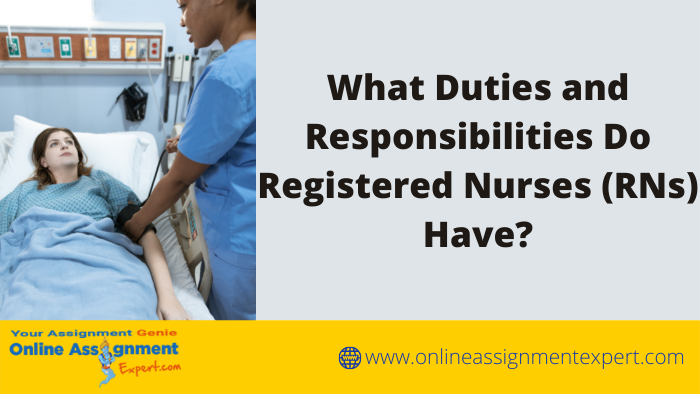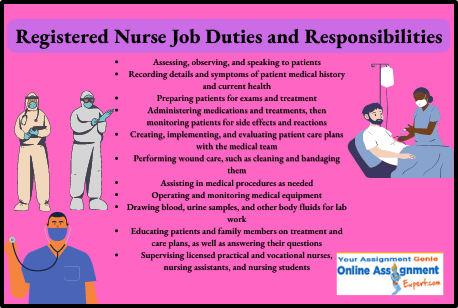
May 21, 2022
What Duties and Responsibilities Do Registered Nurses (RNs) Have?
No 1 Assignment Help
is only a click away.
What Duties and Responsibilities Do Registered Nurses (RNs) Have?
Nurses have an important role in helping patients manage their physical requirements, manage health complications, and avoid disease. As qualified and experienced medical team members, nurses have a vast variety of intellectual abilities, as well as a wide range of responsibilities, which may change from one individual to another. Understanding what primary health care nurses for can help you get a career as a nurse or progress your medical career. Nursing assignment help is a great online resource for nursing students who need assistance with their assignments. You will be astounded by the breadth of their medical knowledge after witnessing the amount of academic work done by their assignment help team.
The duties of a nurse vary based on where their work, what licences they have, and how much experience they have. In this blog, we'll go over all the most prominent nursing credentials, discuss where nurses can practice, and discuss several of the most important nursing obligations with the support of our nursing assignment help experts.

- Maintaining a record of the patient's previous medical history - Nurses keep thorough records of their patients' condition in order to provide them with the finest treatment possible. Most nurses begin by inquiring about the health history, including preceding hospitalizations and operations, ongoing medications, contraindications, and any relevant family health records. They may also inquire about any presenting symptoms and take physiological parameters.
- If the patient receives a new assessment, treatment, or medication during their visit, the nurse may be responsible for compiling and maintaining the patient's medical record. Medical records must be accurate and thorough in order to deliver maximum quality of healthcare.
- Treatment and medication administration - Most nurses can provide medicines and treatment to their patients with a doctor's order. They can also help their patients develop a therapy strategy. Registered nurses, for example, may be able to administer medications without a doctor's approval. Nurses can help with wound treatment and medication, dressing, and needle implantation, among other things. Nurses may also perform more sophisticated procedures or administer emergency care to severely ill individuals.
- Collaboration with teams in care delivery - Nurses are responsible for acquiring patient data and communicating it to the remainder of their healthcare team. Because this is such an important position, nurses must have excellent communication and presentation skills in order to properly connect with medical practitioners. Patients and family members will benefit from clear, succinct communication because they will understand all or most of the information provided.
- Perform medical tests - Nurses can undertake a variety of medical techniques, including checking vital signs and collecting tissue, plasma, excrement, or urination for examination. Nurses must pay attention to detail to ensure that these procedures are carried out correctly, as they will use this information to diagnose patients and create treatment plans. Nurses may also be responsible for evaluating the data and communicating them towards the rest of the health professionals.
- Performing medical examinations - Nurses commonly undergo medical examination of patients at the outset of their session to assess their general health. Taking the patient's temperature, measuring them, tracking their pulse, and testing their cardiac output may be necessary. Sensitivity tests, lymph node checks, and examinations of the patient's eyes, ears, nose, and throat may all be part of this evaluation. The medical examination enables nurses and the remainder of the medical team with an up-to-date picture of the patient's condition, as well as an opportunity to talk about the patient's health goals and concerns. The Online Assignment Expert's assignment help team can provide you with the necessary training and abilities to complete this task.
- Keeping track of patients' medical condition - Nurses must continuously watch and examine their patients in order to record any symptoms or critical information that could lead to a diagnostic or an addressing the challenges related adjustment. These include double-checking patient records to ensure that correct medicines and quantities are recorded, replacing IV lines on a regular basis, and assessing the patient's symptoms. As a result, nurses must pay close attention to their patients' body language in order to figure out what's causing their medical issues.
- Providing patients with assistance and guidance - Individuals must feel supported for, acknowledged, and understood, particularly when nurses must impart unpleasant illness news. Patients usually seek nursing assistance and guidance to better comprehend their symptoms and determine the next steps to take. In these instances, nurses who are sensitive to patients and caregivers can provide assistance and encouragement. They may also offer their patients valuable strategies to cope as well as inpatient mental health therapeutic choices.
- Using and maintaining medical equipment - Biosensors, medical instruments, pulse oximeters, thermostats, and blood pressure machines are among the diagnostic tools used by nurses to deliver quality care. Nurses may be taught to operate more sophisticated technology, such as intravenous fluid pumps, ventilation equipment, and wound drainage systems, according to their work and what licenses they have. Nurses with a solid foundation in science and mathematics can better operate medical devices and evaluate data. If not, they may always avail our top-notch medical science assignment help services.
- Teaching people how to manage their illness - A nurse's job entails educating patients about various medical problems and providing clear guidance on how to manage their ailments. This could include describing which medications the patient has to take, when an obey appointment should be made, and how to undertake therapeutic techniques or activities. Nurses may also discuss any additional comment home care requirements to a patient and family members or caretaker. Diet and nutrition counseling, as well as increased physical treatment recommendations, are examples.
- Sometimes nurses may also give talks at seminars, help with plasma drives, or help with routine inspections and vaccination clinics in order to educate the public about common ailments.
- Staff education and training - In addition to their clinical job, qualified nurses with sufficient experience may assist in the training and supervision of newcomers to their medical teams, such as vocational nurses and doctors' aides. Some nurses also might work with medical students by delivering training classes at a local college or continuing education programs for nurses who want to develop in their careers.
Overall, the duty of a Registered Nurse (RNs) is very important in handling the affairs and logistics of clinical settings. There is tough competition and high expectations from students who want to pursue this field. To gain the best nursing work opportunity, we recommend that setting strong foundations through nursing assignment help is crucial for shaping your nursing future.
Related Blogs
Subscribe Our Newsletter & get Information about latest courses









